SFA University
July 23, 2020 - The appointments of three Stephen F. Austin State University faculty members to serve in interim leadership roles were approved by the Board of Regents during a regularly scheduled meeting today.
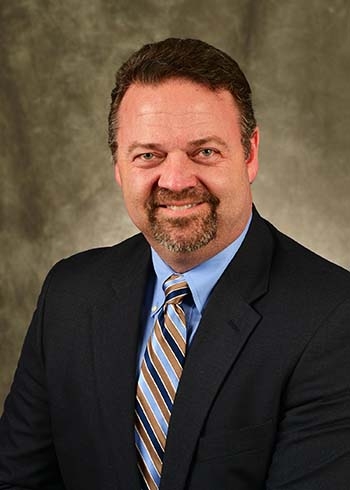
Matthew Beauregard, professor of mathematics and statistics, was named interim chair of the Department of Physics, Engineering and Astronomy. Beauregard holds a degree from the University of New Hampshire and a master’s degree and doctorate from the University of Arizona at Tucson. He joined the SFA faculty in 2014.
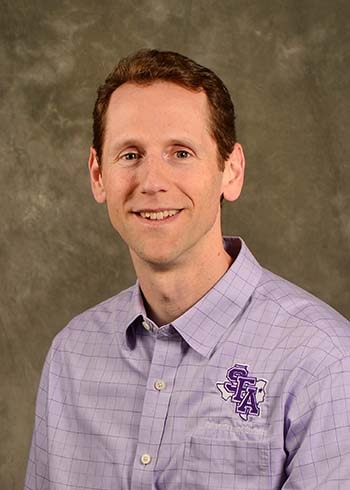
Kevin Langford, associate professor of biology and director of pre-health professions programs, is serving as interim chair of the Department of Biology. Langford joined the SFA faculty in 2002 and holds degrees from SFA and a doctoral degree from the Medical College of Wisconsin.
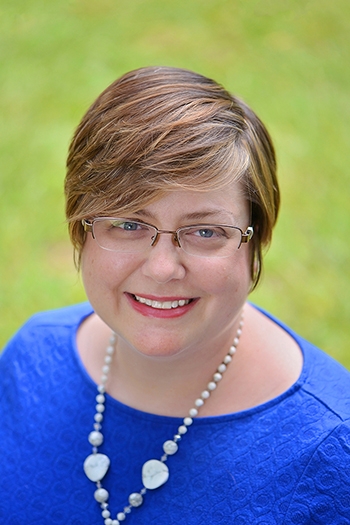
Chay Runnels, associate professor of human sciences, was approved to serve as interim director of the School of Human Sciences. Runnels holds degrees from the University of Texas and a doctoral degree from SFA and joined the SFA faculty in 2005. She replaces Dr. Lynda Martin, whose retirement was approved by regents.
Also in the education college, Ginney Love Watkins, a master teacher in the Early Childhood Lab, was approved as a visiting assistant professor of human sciences. Kelly Finnerud, who previously served as a teacher aide and substitute teacher, was appointed to a teaching position at the Charter School. Ande Wallace also was approved as a Charter School teacher.
Elizabeth Gound’s promotion to assistant professor of elementary education was approved by regents, and Tonya Jeffery and Kevin Jones were approved as new assistant professors of education studies. Other approvals included Jill Pruett, clinical instructor of human sciences; Elaine Turner, assistant professor of human services and educational leadership; and Robyn Whitehead, assistant professor of kinesiology.
Appointments in the College of Sciences and Mathematics included Jeremy Becnel, a professor of mathematics and statistics, who was approved to serve as a professor of computer science. The appointment of Dipak Singh as an assistant professor of computer science also was approved.
Jordan Baker, Morgan Benton, Sherry Cheever and Ashley Goar were approved as clinical instructors of nursing.
New faculty members in the College of Fine Arts included Margaret Fay, visiting assistant professor of music, and James Taylor, lecturer of sound recording technology.
In the College of Liberal and Applied Arts, Christine Bishop and Ronald Rush were approved as assistant professors of social work. Gregory Smith is a lecturer for languages, cultures and communication, and Spencer Willardson is an assistant professor of government.
In Human Resources, John Wyatt was promoted from assistant director to associate director. The promotions of Lisa Balty and Deja Peterson from human resources representatives to senior human resources representatives were approved, as was the promotion of Kimberly Odems, from specialist III to senior human resources representative.
Tanner Boyd and Colleen Gallagher were approved to serve as assistant general counsels to the university. Deborah Rossler was approved as construction project manager in the Physical Plant.
The appointment of Marcus Walker as assistant football coach was approved by regents, as was the promotion of Aidan Pool, from athletic training graduate assistant to athletic trainer.
Faculty development leave was approved for Jane Long, mathematics and statistics, for the spring 2022 semester.
Regents approved the retirement of Gary Kronrad and his appointment as Professor Emeritus of forestry and environmental science. Other retirements approved included Neill Armstrong, secondary education; Larry Bishop, English and creative writing; Regina Brown and Cynthia McCarley, nursing; Deborah Cady and Robbie Steward, human services; Jere Jackson, Center for East Texas Studies; Marcus Madden, University Police Department; and Karren Price, government.
July 22, 2020 - A station completely free of seven major food allergens is one of several new features in an extensive, ongoing renovation to Stephen F. Austin State University’s Baker Pattillo Student Center dining hall.
Other major features include a dedicated “plant-forward” produce station to replace the former salad bar, a redesigned bakery allowing for confectionary pickup orders, a meat carvery station that will focus on lean meats, and the implementation of various physical distancing and health safety measures.
Construction began in April and is scheduled to be complete before the start of the fall semester.
“Because there are millions of people with food allergies, we knew we needed to better serve our students by having a more inclusive concept in the dining hall,” explained Carrie Charley, SFA’s director of auxiliary services. “In a commercial kitchen, it is nearly impossible to prevent cross-contamination. At this new allergen-aware station, all ingredients are kept separate from other dining hall menu items from the moment they arrive on the student center’s back dock until the moment the dish is served.”
The innovative meals offered through the station will be free of seven of the eight most common food allergens: milk, egg, peanut, tree nut, soy, wheat and shellfish. The eighth allergen, finfish, was kept to provide sufficient protein variety, Charley said.
“For the past several years, we’ve been tracking how many students have dietary restrictions, and that number has increased,” said Jill Hamilton, an Aramark senior specialist registered dietitian. “The allergen awareness station was added to make it easier for those with restrictions to identify offerings. Even if someone doesn’t have an allergy, I think they will still enjoy the station.”
While some dietary restrictions are based on a diner’s personal preferences, food allergies are not, and exposure to certain food products can be potentially dangerous to students with those allergies. Allergen-aware staff members will prepare dishes using dedicated kitchenware and utensils that have been thoroughly washed and sanitized between uses.
SFA has, for years, utilized allergen and nutritional information cards, which are placed near each dish at dining hall stations. The new dedicated station is the next step toward ensuring increased levels of student health awareness and dietary flexibility.
While universities nationwide are expanding their allergen-aware accommodations, SFA “might be one of the first to also use this new space as a teaching kitchen,” Charley said. “Once we are able to safely do so, we hope to host teaching tutorials and cooking competitions from this space in the evenings and during special events. We have special seating designed around the area that is movable and customizable for small groups.”
The concept of plant-forward offerings, which emphasizes “healthy plants at the center of the plate with a proportionally small quantity of animal protein,” Hamilton explained, is not a new one. SFA began adding plant-forward dishes two years ago, including such offerings as lentil “meat” loaf, grilled veggie skewers and cauliflower wings.
Several other stations in the dining hall also offer plant-forward dishes, but the newly revamped and expanded plant-forward produce station will provide a dedicated space for and expansion of these offerings. It also provides more flexible and diverse options for vegan and vegetarian diets, although every station also includes a vegan dish.
“I am super excited about the new produce station,” Charley said. “According to Dataessential, nearly 40% of Americans say they are eating less red meat and are seeking more vegetables. This trend is called ‘plant forward,’ putting plants (fruits, veggies, whole grains, nuts, beans) at the center of your plate. This renovation bursts open the doors to new possibilities for dining on our campus with a fresh perspective, fresh ingredients and a bright new landscape to enjoy meals together.”
Aside from expanding food options, the student center dining hall renovation also has updated food service procedures and modernized seating and dining aesthetics.
“The entrance to the dining hall has been expanded by 16 feet and provides a more open view into the entire facility,” Charley said. “There are three self-check-in stations and also pre-packaged to-go meals available.”
With the outbreak of COVID-19, additional safety and distancing measures were added to the renovation project, including the design of 25%, 50% and 75% capacity seating plans by architects Tipton Associates, based in Baton Rouge, Louisiana.
“With those plans, we will be able to adjust as needed before it is time to load the furniture in,” Charley said. “Most of the crowd control and occupancy management will be handled by the dining team, with the cooperation of our guests. The new check-in stations are self-swipe, and the dining team will serve food rather than having self-service, keeping things as contactless as possible. We now also have outdoor seating available facing the beautiful view down Vista Drive.”
Visual cues will be implemented throughout the hall to keep diners at a safe distance from each other. Sneeze guards have been a standard fixture in all dining halls, but extra guards were added to fill gaps.
“Face masks are required to be worn while in line and walking from station to station,” Charley added. “You also will see staff members in masks and frequently cleaning throughout the day. You might see that a station is temporarily closed during 15-minute intervals for deep cleaning and utensil replacement.”
For more information on fall 2020 dining options and updates, visit the “Dining” section on sfasu.edu/fall2020.
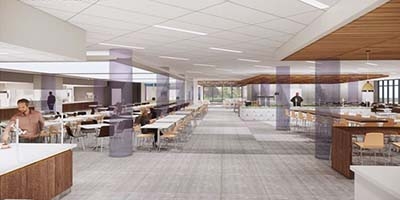
A digital rendering of Stephen F. Austin State University’s Baker Pattillo Student Center dining hall renovation project provides a glimpse of the facility’s modernized look. The project is scheduled to be complete before the start of the fall semester and includes plans for social distancing and increased student safety.
By Christine Broussard, marketing communications coordinator at Stephen F. Austin State University.
Contact: University Marketing Communications (936) 468-2605
July 17, 2020 Nacogdoches — Despite being in the midst of global change, Stephen F. Austin State University has announced significant enrollment increases in both of its summer semesters.
“SFA’s summer enrollment increases are a testament to a number of exciting things,” said Dr. Scott Gordon, SFA president. “First and foremost, it’s an indication that now more than ever, people understand the value and importance of pursuing higher education. It also reaffirms our campus community’s excitement of and investment in our new Lumberjack Education Assistance Program, which was approved by the Board of Regents in April, and that our swift work to expand flexible learning options allowed students to take classes from anywhere, regardless of their situation.”
According to data collected through SFA’s Office of Institutional Research, summer I experienced an 8.8% increase in student enrollment, jumping from 3,741 in 2019 to 4,071 in 2020, or a difference of 330 students. Undergraduate headcount comprises the main difference, jumping 13% from last year’s summer I semester.
Summer II headcount is up by 10%, jumping from 3,109 in 2019 to 3,422 in 2020, or a difference of 313 students. Undergraduate and graduate headcount totals both increased for summer II, with undergraduate increasing by 10% and graduate by 11%.
“Expanding our flexible learning options has clearly resonated with students who still seek to learn in a rapidly changing world,” said Gordon. “Also, it is exciting that many SFA employees and their family members are taking advantage of LEAP because this helps promote our Strategic Plan’s goal by attracting and supporting high-quality faculty and staff.”
For summer I, the Arthur Temple College of Forestry and Agriculture reported the highest overall percentage increase at 48%, or an addition of 93 students. Summer I credit hours also increased by 7.8% overall, with the largest volume credit hour increase in undergraduate sciences and mathematics.
For summer II, the College of Sciences and Mathematics reported the highest overall headcount increase at 41%, or an addition of 169 students. Summer II credit hours increased by approximately 10%, with the largest volume credit hour increase in undergraduate sciences and mathematics.
For additional enrollment data, visit sfasu.edu/ir.
By Christine Broussard, marketing communications coordinator at Stephen F. Austin State University.
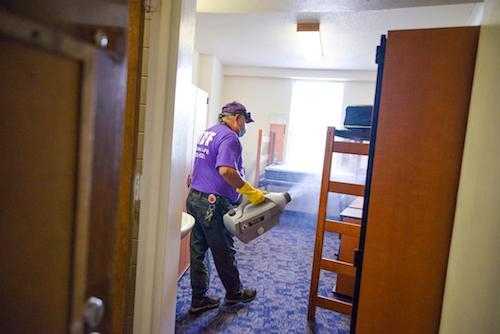
J.R. Florez, an employee with Stephen F. Austin State University’s Residence Life Department, mists a room in Steen Hall with a hypochlorous acid, a disinfecting compound the custodial staff says is safer and more effective than bleach. All residence hall rooms have been treated with the disinfectant and will have been treated twice when students return to campus in the fall.
July 3, 2020 Nacogdoches — Residence halls at Stephen F. Austin State University will open to students for the fall 2020 semester but with a sea change of new safety measures that will be continually evaluated as the global pandemic evolves.
Residence Life Department staff members have implemented extreme alterations to traditional housing upkeep in an effort to provide the safest possible college residential experience for returning students this August. These alterations include a wide array of increased sanitation measures at the 11 housing facilities available to students for the fall.
Housing also continues to be offered during the summer term, which has allowed SFA employees to evaluate and update sanitization effectiveness and communication best practices. Residence Life is currently taking applications for summer II housing.
“We are excited to welcome our students back home,” said Shea Roll, assistant director of SFA’s Residence Life. “We are connecting with students through virtual programming and social distancing events. Last week, we had an event with water balloons filled with soap, water and washable paint that the students who are on campus this summer loved! More than ever, community and connection is important to us in our halls.”
Key highlights of the new safety measurements include:
- Each residence hall will have its own full-time custodial staff members who will clean common restrooms and other high-traffic common areas during the day and at night Monday through Friday. A limited number of full-time custodians will disinfect common restrooms and high-traffic areas and clean where needed on weekends.
- A full-time staff member is available seven days a week from 4 p.m. to midnight to provide assistance when requested through the University Police Department.
- Seating will be reduced in all Residence Hall common spaces, and use of community areas like kitchens will be limited.
- Residence halls are not open to the public. Visitation privileges have been amended to allow no more than two additional people in a room or suite at any given time. In addition, both roommates have to agree to this visitation policy before guests may visit.
- All student and professional staff members are required to wear masks. Hand sanitizer stations will be set up, and staff member desks have plastic protectors so they may safely answer resident questions.
- Each hall has a unique 24/7 phone number residents may call if they need anything, from accidentally locking themselves out of their room to reporting signs of illness. They will always have access to a student and professional staff member on call.
- Roommate agreements are amended to include questions about physical distancing in the rooms, sharing items, visitors and wearing masks. Residence Life staff members want to ensure students are communicating their needs to each other on day one, so these agreements help set the tone for expectations within their shared space.
- The university also will offer single bedrooms as they become available to those currently on a waitlist for these rooms.
- A plan also has been formed for students who might become sick, with an immediate protocol for isolation, testing and contact tracing.
Residence Hall sanitization has increased in frequency and potency. Staff members use a GenEon cleaning and disinfecting system containing a hypochlorous solution, a powerhouse cleaning system SFA makes on site at the rate of five gallons per hour.
“This solution, unlike bleach and harsh disinfectants, is safe and a non-irritant. If it gets on your skin or in your eyes, it does not burn,” explained Frank Ronzello, SFA custodial supervisor III. “Even if it is accidently ingested, it is completely harmless. It requires no PPE. It is 70 to 80 times more efficient at killing microbial pathogens than bleach.”
Hypochlorous acid also is used on food and in food service sanitation, as well as in wound care and eye care products, he added.
“We purchased the hypochlorous acid system two years ago to treat buildings if there was a flu outbreak or any other type of airborne illnesses and to treat areas with mold or mildew issues,” Roll said. “The ability to produce hypochlorous acid is something completely unique to SFA and really shows our commitment to safety. While other universities were busy purchasing hypochlorous acid, we were already producing our own.”
Custodial staff members have been using the cleaning compound in all housing facilities since the outbreak of COVID-19 to treat all high-touch-point areas before and after students come to campus.
“We also have treated every vacant room prior to our custodial employees entering the rooms to perform their summer cleaning and disinfecting,” Roll said. “We also will treat rooms after any camps and summer school and use it to treat all high-point-touch areas when students return in the fall.”
The university also announced it would be lifting the on-campus living requirement that stated incoming freshman or underclassmen with less than 60 credit hours must live in campus residence halls.
Additionally, the contract cancellation deadline was extended to midnight July 12. Any cancellations received by that time will be refunded.
“We recognize that in this time, students may be more comfortable not living in a residence hall environment, so we want to be as considerate and as flexible as possible,” Roll said.
While prevention and regular cleaning are key, SFA employees have established staunch protocols should a case of COVID-19 be reported on campus.
“We have worked closely with SFA’s Health Services and have a plan for students who might become sick, with an immediate protocol for isolation, testing and contact tracing. We also would deliver meals to their door. A Residence Life staff member would personally call them twice daily to check on how they are doing, and the Health Clinic would hold Zoom appointments,” Roll said. “We offer Zoom counseling services to these students as well, because at no point do we want them to feel disconnected from their SFA community during isolation. The rooms we have set aside have goody bags with Gatorade, snacks and get well notes along with campus resource numbers. Our goal is to make them as comfortable as possible.”
The current move-in calendar for the fall semester is Aug. 13 through 23. Students must sign up for a two-hour move-in slot and are allowed to bring two individuals to help them with the move.
Students can access the move-in sign up through my mySFA Residence Life tab. Move-in sign up will open at noon July 9 and will remain open through Aug. 23. Students must have two emergency contacts listed in Banner prior to signing up, which can be completed through mySFA by selecting “Update Emergency Contact” on the Home tab.
“They also can change their move-in time up to 24 hours before it occurs to allow as much flexibility as possible; however, we are limiting the number of students allowed to sign up per hall, per shift to allow for social distancing,” Roll said. “When they arrive, they will receive a check-in packet with their key, student ID, helpful tips on how to stay safe on campus and instructions on how to complete an online inspection of their room so we can address any concerns they have right away.
“This one-stop move in will allow for flexibility and social distancing beginning as soon as they walk in the door,” she added. “They also will meet their community assistant, who is an upperclassmen mentor living on their floor to help them with whatever they need and to connect them with the SFA community.”
First-year students attending Jack Camp Orientation, which will be held on campus Aug. 16 through 19, will be given priority to pick move-in shifts.
Currently, approximately 3,500 students have committed to living on campus in the fall.
July 3, 2020 - Mirroring state and national trends to streamline admission procedures in the wake of the ongoing pandemic, Stephen F. Austin State University’s Office of Admissions has announced it will begin test-optional admissions for all 2021 terms.
This decision was prompted by the cancellation of SAT and ACT exam administration as testing centers across the state struggle to accommodate test participants due to required social distancing standards.
“High school seniors continue to experience significant restrictions regarding in-person testing opportunities and challenges with virtual testing,” said Erma Nieto Brecht, SFA’s executive director of enrollment management. “Because of this, students hoping to enter SFA in 2021 will not have to worry about having a standardized test score to apply for admission.”
While the test score requirement is lifted for the admission process, students who were able to take the SAT or ACT are encouraged to submit those scores with their ApplyTexas application as they may be needed in the scholarship review process.
“Submission of tests scores will not create any unfair advantage or disadvantage during the admission review for those students who provide them,” Nieto Brecht said. “We still want to encourage students to take an upcoming ACT/SAT test, if possible, or submit an existing test score, as the ACT/SAT may be required and utilized for scholarship review.”
For more information, visit sfasu.edu/freshman.
June 30, 2020 - The Wildlife Society, an international professional organization of leaders in wildlife science, named the Stephen F. Austin State University student chapter as its national 2020 Student Chapter of the Year.
The annual award recognizes exceptional achievements by student chapters in the promotion of professional standards, outreach and education, as well as advocacy for conservation policy decisions.
“To be recognized across the nation is a huge compliment to our officers and students,” said Jake Hill, forest wildlife management major and president of the SFA student chapter of The Wildlife Society. “It’s a testament to the quality of our college, our forest wildlife program and the university itself.”
Earlier this year the chapter received statewide recognition when it was named Student Chapter of the Year by the Texas Chapter of The Wildlife Society.
Hill said during the past year the student chapter focused on developing its student membership as active wildlife professionals.
One of the chapter’s most public initiatives was the development of a policy program to advocate for the bipartisan Recovering America’s Wildlife Act, which would make supplemental funds available to states for the management of wildlife most in need of conservation. These efforts included writing letters and conducting education campaigns, communicating with state representatives and partnering with other conservation organizations to advance the bill.
In addition, the chapter amplified partnerships with other conservation organizations, such as the Texas Parks and Wildlife Department, the National Wild Turkey Federation and other smaller nongovernmental organizations.
This spring, the chapter completed a wetland restoration project with Conservation Equity Partners, a local SFA alumni-owned environmental consulting firm. Through this partnership, the chapter planted more than 5,000 trees and gave away approximately 10,000 trees to the public.
“The students involved with the SFA student chapter of The Wildlife Society are outstanding ambassadors for SFA and are well known for their willingness to serve the profession and the community,” said Dr. Hans Williams, dean of SFA’s Arthur Temple College of Forestry and Agriculture.
The SFA chapter also donated a portion of its annual fundraising proceeds to assist a newly formed student chapter of The Wildlife Society at another Texas university.
“This award recognizes the hard work of the highly motivated and professional students we have in our program,” said Dr. Daniel Scognamillo, associate professor of forest wildlife management and faculty advisor for the SFA student chapter of The Wildlife Society.
Winning chapters receive a plaque, as well as a $1,000 travel grant to attend the annual Wildlife Society Conference. The name of the chapter also will be added to a permanent plaque on display at The Wildlife Society’s headquarters in Bethesda, Maryland. The SFA student chapter will be recognized at the national conference held virtually in September.
To learn more about the SFA student chapter of The Wildlife Society, its mission and current initiatives, email sfasuthewildlifesociety@gmail.com.
Story by Sarah Fuller, outreach coordinator for Stephen F. Austin State University’s Arthur Temple College of Forestry and Agriculture. Contact information: (936) 468-1185 or fullersa@sfasu.edu.
The Wildlife Society, an international professional organization of leaders in wildlife science, named the Stephen F. Austin State University student chapter of The Wildlife Society as its national 2020 Student Chapter of the Year. The annual award recognizes exceptional achievements by student chapters in the promotion of professional standards, outreach and education, as well as advocacy for conservation policy decisions. Pictured is the SFA student chapter at the statewide Texas Chapter of The Wildlife Society meeting held earlier this year in Corpus Christi. The SFA student chapter also was named Student Chapter of the Year by the Texas Chapter of The Wildlife Society.
June 26, 2020 - Sounds of chirping frogs filled the air, but it wasn’t coming from the pond students in Stephen F. Austin State University’s STEM Academy sat near. Sarah Riley and Kennedy Tinajero listened intently on a laptop to breeding frog calls they recorded, counting the number of frogs and seeking to identify the different types of calls for a project examining the factors that influence frog behavior.
Entering their senior year at Lufkin High School, Tinajero and Riley have been a part of SFA’s STEM Academy since their freshman year, exploring science, technology, engineering and mathematics. While most of their learning has taken place in a classroom setting in the past, they now have the opportunity to conduct research in the field with the help of SFA faculty members.
“Every year we get to learn something new and discover what we’re most passionate about,” Riley said. “This year we got to go off on our own, do research, and meet with professors and learn what they do, so this has been a really special experience for us.”
Riley and Tinajero are using a Song Meter borrowed from the U.S. Department of Agriculture Forest Service Southern Research Station to collect data from a pond inside the Lufkin city limits, as well as utilizing data collected by the Forest Service from a pond in a local national forest. The Song Meter records sounds for a minute every hour from 9 p.m. to 2 a.m., giving the students six minutes of data per site to analyze.
“We’re trying to see what factors play into the calls, learn about the different types of calls and see how many frogs there are,” Tinajero said. “It’s really interesting, and I’m happy that we’re doing it.”
Because there is an increase in breeding frog call activity during the summer months, the students will be able to record several species of frogs to determine species richness, said Dr. Erin Childress, lecturer in SFA’s Department of Biology. Childress assisted the students with initially sorting through the data, pointing out the different frog calls.
“My vision as a mentor is for these students to think about the entire scope of a research project from beginning to end,” Childress said. “This includes thinking about broad questions they have about nature, narrowing down what specific questions they are curious about, and considering what methods are most appropriate for analyzing the data, what knowledge is gained from the results of the data, how this information adds to the broader scope of knowledge, and what limitations they faced in this study that could have influenced the conclusions they make.”
Students in SFA’s STEM Academy begin high school with a cohort of students and progress through elective courses with them. The students are encouraged and expected to enroll in dual credit and advanced mathematics and science courses, said Dr. Jana Redfield, assistant director of the STEM Research and Learning Center.
“The students in the cohort work in SFA laboratories on college-level experiments guided by university faculty members and lab assistants,” Redfield said. “They sharpen their cooperative learning skills during these laboratory sessions. They are also challenged to think and problem-solve and are given the opportunity to conduct independent research.”
To learn more about STEM Academy and the STEM Research and Learning Center, visit sfasu.edu/STEM.
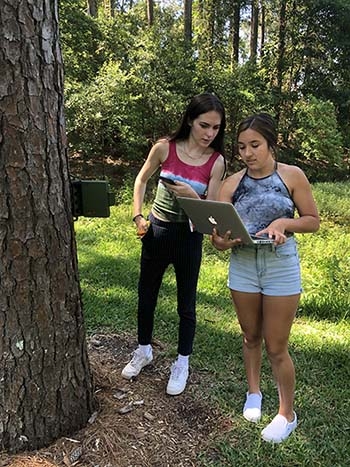
Lufkin High School seniors Sarah Riley, left, and Kennedy Tinajero examine data from a Song Meter
while working on a project for Stephen F. Austin State University’s STEM Academy.
Using the Song Meter, Riley and Tinajero are collecting recordings
of breeding frog calls to examine the factors that influence frog behavior.
June 25,2020 - Like all universities and public and private school systems across the globe, Stephen F. Austin State University found itself in mid-March suddenly shifting from delivering all in-person classroom instruction to online.
Some courses adapt to remote instruction easier than others. Scott Shattuck, associate dean of the SFA College of Fine Arts, was especially curious to learn how faculty members in the schools of art, music and theatre would teach performance skills and studio art technique courses through remote delivery.
“I heard a couple of especially interesting accounts from students and colleagues who had unexpectedly found themselves in this experimental mode,” Shattuck said, “and it made me think: ‘I’ll bet others would be just as fascinated as I am to learn about the creativity our faculty employed to meet these challenges.”’
Shattuck, along with media specialist Michael Tubbs, initiated a series of videos, “The Creative Challenge,” that features fine arts instructors who have developed some unique virtual teaching strategies to try and ensure that students continue to learn and pursue their work as artists. These can be viewed at finearts.sfasu.edu/creative.
In addition to making these creative teaching ideas available for other educators to incorporate in their virtual classrooms, Shattuck hopes the podcast shows students, prospective students and their families “just how brilliant our College of Fine Arts teachers really are,” he said.
“And, if members of our alumni who are now teaching art, music or theatre, or other faculty members around the country, can take advantage of some of the wonderful ideas described in the podcast interviews, that’s an additional benefit to emerging artists everywhere,” he added. “I hope these interviews make it vividly clear that there’s no stopping creativity. Teaching, learning, and creating art were practically uninterrupted when the pandemic turned our world upside down.”
On social media platforms, the College of Fine Arts has been using the hashtag #ArtsKeepUsGoing, “because everyone has been sustained over the past few months by the songs, movies, books and other creative expressions that keep us connected in such important ways even when we’re physically distanced from one another,” Shattuck said. “We’ve also asserted that #ArtsWillLeadUsBack, because it’s creativity that will fuel the research, the economic revival and the community spirit we’ll need to restore the health and vitality of our society.”
As an educator, Shattuck said he is both humbled and inspired by the resourcefulness and resilience that he’s been fortunate to witness in SFA fine arts faculty.
“The only course I was teaching in the spring was already online and, honestly, I don’t know what I’d have done to keep the teaching, learning and creating going if I’d been teaching a face-to-face technique class,” he said. “These colleagues have given me ideas but, more importantly, they’ve given me hope.”

June 25, 2020 — The Counseling Clinic at Stephen F. Austin State University will be hosting a free weekly tension, stress management and relaxation group starting at 3 p.m. July 1 via Zoom.
All are welcome to join the one-hour, open discussions and learn new relaxation techniques to better manage stress.
Research has shown that prolonged stress can cause or exacerbate many serious health problems, including:
- mental health problems, such as depression, anxiety and personality disorders
- cardiovascular disease, including heart disease, high blood pressure, abnormal heart rhythms, heart attacks and stroke
- obesity and other eating disorders
- sexual dysfunction, such as impotence and premature ejaculation in men and loss of sexual desire in both men and women
- skin and hair problems, such as acne, psoriasis, eczema and permanent hair loss
- and gastrointestinal problems, such as gastroesophageal reflux disease, gastritis, ulcerative colitis and irritable colon.
Two counselors in training, Mai Lee Eskelund and Breuna Timmons, will facilitate the Zoom sessions. They designed the stress management group to teach participants skills for reducing and managing stress and creating opportunities that enhance self-care.
In addition to the free group, the clinic continues to accept new clients and waive fees during the pandemic.
Though in-person appointments aren’t possible because of COVID-19 concerns, the clinic is helping clients via Zoom from 11am to 9pm Monday, Tuesday and Thursday and from 11am to 5pm Wednesdays. Appointments on Fridays can be made by calling (936) 468-1041.
Once the pandemic is over, the clinic will return to its usual fee system. Costs for community members are determined using a variable fee scale based on gross family income and family size ($5 minimum to $20 maximum per service). SFA students pay $5 per service.
The Counseling Clinic is part of the Department of Human Services and Educational Leadership in the James I. Perkins College of Education at SFA. It assists SFA students and community members while training graduate students who are in the practicum and internship portion of their education. These graduate students provide counseling services to clients under the supervision of licensed counselor education faculty members.
For more information or to sign up for the stress management group, contact the clinic at (936) 468-1041 or sfacounselingclinic@sfasu.edu.
ORGS and the Division of Academic Affairs conduct a university-wide call for proposals, and the deadline for submissions is typically the end of October. The University Research Council conducts a blind peer review of all applications. Grant awardees are notified early in the spring semester, and projects are funded through the remainder of the fiscal year.
This year, ORGS received 13 applications, and the council selected six recipients. Monies awarded totals slightly over $130,000.
2020 Research and Creative Activity Grants
Dr. Carmen Montaña-Schalk - Department of Biology, College of Sciences and Mathematics
Examining the Effects of Predators on Energy and Nutrient Exports across Aquatic-Terrestrial Boundaries
Montaña-Schalk’s study will investigate how aquatic predators (e.g., fish and invertebrates) in permanent ponds influence biomass and transport of nutrient subsidies from water to terrestrial boundaries (e.g., ponds to forest) via amphibian migrations.
Dr. Bidisha Sengupta - Department of Chemistry and Biochemistry, College of Sciences and Mathematics
Unraveling the Pathway of Aggregation of Amyloin beta-peptides with the Intention of Prevention of Alzheimer’s Disease using Neurotransmitters and Phytochemicals
The aim of Sengupta’s project is to understand the mechanism of the onset of Alzheimer’s disease at the molecular level by studying the unfolding process of amyloid B-peptide (AB). Furthermore, Sengupta will investigate the role of naturally occurring chemicals, including Tryptamine-based sleep regulatory neurotransmitters melatonin and serotonin, and plant flavonols (mono/polyhydroxyflavonoid), against aggregation of AB, which is the key factor for Alzheimer’s disease. This naturopathic noninvasive way to prevent Alzheimer’s disease is likely to create a connection between sleep regulation, healthy diet and dementia.
Dr. Yuhui Weng – Forestry and Spatial Science, Arthur Temple College of Forestry and Agriculture.
Effects of Thinning on Needle Decomposition in Loblolly Pine Plantations in the West Gulf Coastal Plain
Thinning is widely used in managing loblolly pine plantations in the West Gulf Coastal Plain region to improve timber productivity and economic benefits. This study focuses on investigating how thinning affects decomposition of needles on the ground and needle nutrient release of loblolly pine — an important issue of plantation ecological environments. The results will provide important messages for managing loblolly pine plantations in the region.
Dr. Jessica Sams - Department of Languages, Cultures and Communication; College of Liberal and Applied Arts
Unreliable Narrators: Dangers of Eyewitness Testimony
Research has demonstrated humans are unreliable narrators because of the fallibility of cognition and memory, yet eyewitness testimony has remained a cornerstone in U.S. court cases. The dangers of eyewitness testimony, especially given by a witness perceived as an expert or authority figure, include the following:
- narrators are subjective and, therefore, fallible
- memories are inaccurate, and details shift to create a cohesive narrative
- original intent or thought is inaccessible and irrecoverable
- testimony is highly mediated yet presented as natural conversation
- and identities being performed skew the importance of details and thus affect aspects of memory-making and event-reporting.
Dr. William Nieberding - School of Art, College of Fine Arts
East Texas: A Portrait in Wet-Plate Collodion
East Texas: A Portrait in Wet-Plate Collodion is a photographic project in which portraits and landscapes made with tin, collodion and light create a unique picture of time in East Texas. Nieberding is researching and experimenting with these materials using historical and contemporary chemical formulas to fine combinations that work best for creating expressive tintypes in the heat and humidity of East Texas. A gallery exhibition of the original tintypes and large-scale inkjet prints created through this research will conclude the project.
Dr. Tingting Xu - Department of Education Studies, James I. Perkins College of Education
Redefine Engineering in Early Childhood Education through Professional Development
Xu’s project intends to examine the impact of a summer intensive professional development on kindergarten and first grade classroom teachers’ content and pedagogical knowledge of engineering, as well as their attitudes and efficacy towards teaching engineering. With a time-series research design using mixed methodological approach, it is expected to discover a significant increase in teachers’ content and pedagogical knowledge of engineering, as well as improved attitudes after the professional development.









